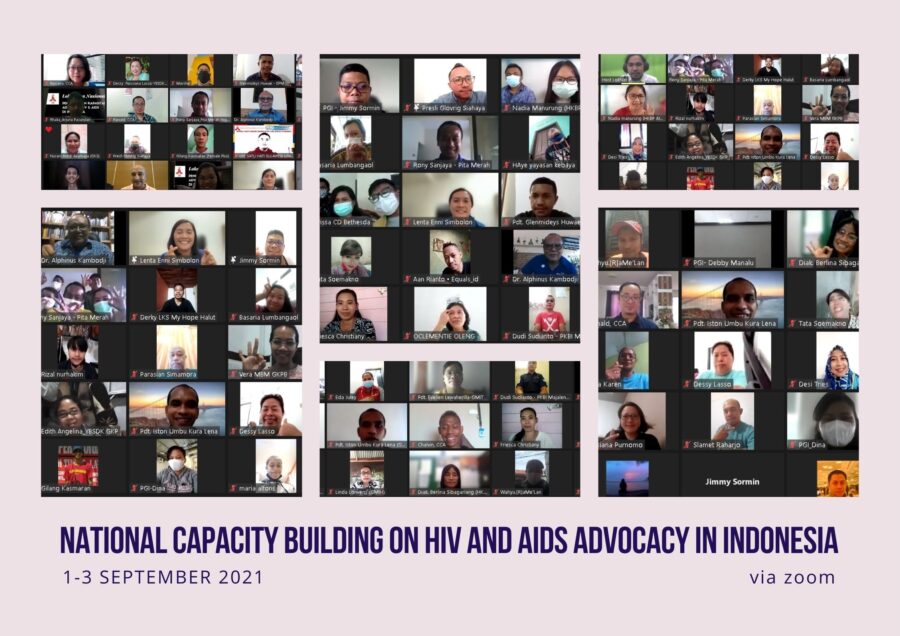Indonesia National Capacity-Building Training to strengthen HIV and AIDS Advocacy calls for communities to support PLHIV amidst the COVID-19 pandemic

The Christian Conference of Asia together with the Communion of Churches in Indonesia (Persekutuan Gereja-Gereja di Indonesia) organised a three-day national capacity-building training programme (in online mode) to strengthen HIV and AIDS Advocacy in Indonesia. It was held from 1–3 September 2021.
Forty participants from different member churches of CCA and PGI from across Indonesia joined the training. Resource persons for the programme included representatives from faith-based organisations, PLHIV (People Living with HIV) organisations, and civil society organisations dealing with HIV and AIDS advocacy.
PGI General Secretary Pdt. Jacklevyn F. Manuputty welcomed the participants and extended his gratitude to the CCA for initiating the programme. He said that strengthening advocacy efforts in prevention, treatment, and support to PLHIV must be a priority of churches in Indonesia, adding that churches must build inclusive care services that included social and spiritual aspects.
“Let us be of service to one another, especially to the marginalised communities in this time of the pandemic,” he continued.
The first session was presented by Daniel Marguari of Spiritia Foundation, an organisation providing quality support and care, and advocating for the human rights of people living with HIV in Indonesia. He provided insights on the HIV and AIDS situation in Indonesia and the barriers that prevented the progress of HIV advocacy, such as lack of access to treatment, lack of government support, as well as societal stigma and discrimination.
A workshop on the myths and facts of HIV was facilitated by Berlina Sibagariang of HKBP AIDS Ministry and Panduarti Prissabat of CD Bethesda. The participants were divided into breakout rooms to discuss the myths of HIV and AIDS in their local contexts and how such narratives contributed to stigma and discrimination. Participants pointed out that advocacy and education of the general public was key to countering incorrect notions of HIV and AIDS and to combat stigmatisation.
The workshop was then followed by testimonies from two PLHIV from Jaringan Indonesia Positif (Positive Indonesian Network). They shared their struggle of being PLHIV during the COVID-19 pandemic. They highlighted the difficulties faced in accessing services because of restrictions related to COVID-19. They also highlighted the fact that PLHIV were at greater susceptibility to COVID-19, and thus access to prevention, vaccine, testing, treatment and assistance related to violence and mental health could not be neglected. They concluded with a call to action leading to the setting up of non-discriminatory and integrated health services and care for PLHIV.
On the second day, a session that focused on the language/discourse surrounding HIV that contributed to stigma and discrimination was presented by Aan Rianto of Jaringan Equals Indonesia, who spoke about the use of unbiased language and about the need for disseminating the right information to counter the misinformation that contributes to HIV stigma.
Vulnerabilities of HIV in terms of Sexual Orientation, Gender Identity and Expression, and Sex Characteristics was presented by Slamet Rahardjo of GWl-INA, a network of community-based organisations (CBOs) working on HIV, health, and human rights issues in Indonesia. He added the imposition of the Yogyakarta principles in responding to HIV and its vulnerabilities aligned with international guidelines relating to sexual orientation and gender identity. Stating that one’s sexual orientation and gender identity was integral to one’s dignity and humanity and could not be the basis for discrimination or abuse, he encouraged the participants to educate their local communities and their leaders so that they were well informed about the issue.
The resource persons further exhorted the participants to contribute towards building an inclusive and welcoming community and to advocate for all people in their communities regardless of their HIV status and orientation.
On the last day of the training, the participants were equipped with tools and perspectives on how to eradicate stigma and end HIV.
Rev. Stephen Suleeman provided a theological perspective on HIV and sexual orientation in church services. He highlighted the role of the church in bringing good news to all without discrimination. “It is about time that the church lets go of its prejudice and starts embracing everyone, regardless of their HIV status and gender orientation,” he added.
Towards the end of the training, Baby Rivona Nasution of Ikatan Perempuan Positif Indonesia-IPPI (Association of Indonesian Positive Women) provided practical information on the current HIV prevention strategies that could be replicated by churches and communities. Such strategies included the ‘ABCDE prevention’, the ‘S.A.V.E.’ approach, PrEP and PEP, ARV treatment, and ‘Undetectable=Untransmitable’.
Action plans for a follow-up consultation were made by the participants with a view to continuing advocacy for the inclusion of PLHIV and raising awareness about HIV and AIDS in Indonesia.











